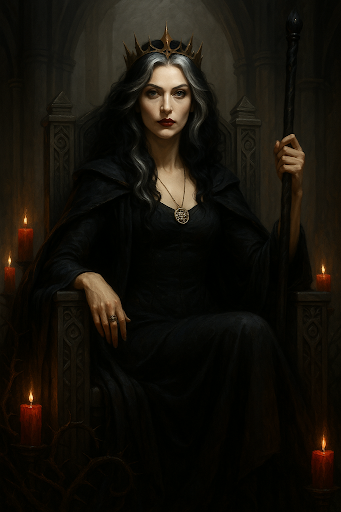Morgana Le Fey
Background:
Morgana Le Fey’s legend is etched in a thousand contradictory stories—witch, sister, villainess, queen. The truth, as always, is far richer.
She was born of Igraine, and shaped by Uther Pendragon’s conquest—a child of magic, ambition, and blood-soaked deception. She saw from the beginning how men used power to wound and claim, and how women who matched that power were feared. Trained in secret arts and steeped in fey influence from a young age, her gift for magic was staggering, rivaling even Merlin’s by the time she came of age.
Her relationship with Merlin was one of passion and pain. Mentor. Lover. Betrayer. They were opposites entwined—he, the orchestrator of Arthur’s fate; she, the sister wounded by that fate. Though she once burned with fury, her love for Merlin never fully died, and their estrangement was one of ideology, not heart.
In her youth, she was exactly what the legends warned: seductress, schemer, wielder of dangerous charms. She warred against Camelot, forged the cursed blade Mordred would wield, and played the role of dark queen with theatrical rage. But it was grief, not defeat, that tempered her.
Love came unexpectedly—King Urien of Gore, a man wise and stubborn enough to see her as more than myth. Their marriage, while rarely recorded, was one of quiet peace and mutual respect. In Gore, she became a ruler, a teacher, a mother to witches, and at last, a woman who understood why mercy matters.
She mourns Arthur still, and regrets the child she shaped into a weapon—Mordred, her greatest sin and most lasting sorrow. She rode beside Nimue and Vivine in Arthur’s final procession, not as a villainess, but as a penitent half-sister.
Since her husband’s passing, Morgana has retreated from the mortal realm. She now rules a haunted province in Otherworld, a place of forgotten spells and sacred groves. She teaches the lost, guards the dangerous, and serves as the final authority on British witchcraft.
She no longer denies the monstrous deeds of her past—but neither does she flinch from them. She is the sum of her regrets, and it is precisely because she once burned the world that she now keeps the fire.
Personality:
Morgana is wise, composed, cunning, and heartbreakingly human beneath her immortal poise. Her greatest weapon is not her magic, but her understanding of pain. She does not flinch from difficult decisions, nor hide from her failures.
She is neither cruel nor kind—but she is fair. And she believes firmly in second chances, though she does not often offer third. With her students, she is sharp but nurturing; with her enemies, cold but respectful.
Despite her past, she does not wallow in self-pity. She simply carries her grief like a crown—not for others to admire, but as a reminder that power without wisdom is ruin.
She still dreams of Merlin, and sometimes she wakes wondering if he dreams of her too
Morgana Le Fey’s legend is etched in a thousand contradictory stories—witch, sister, villainess, queen. The truth, as always, is far richer.
She was born of Igraine, and shaped by Uther Pendragon’s conquest—a child of magic, ambition, and blood-soaked deception. She saw from the beginning how men used power to wound and claim, and how women who matched that power were feared. Trained in secret arts and steeped in fey influence from a young age, her gift for magic was staggering, rivaling even Merlin’s by the time she came of age.
Her relationship with Merlin was one of passion and pain. Mentor. Lover. Betrayer. They were opposites entwined—he, the orchestrator of Arthur’s fate; she, the sister wounded by that fate. Though she once burned with fury, her love for Merlin never fully died, and their estrangement was one of ideology, not heart.
In her youth, she was exactly what the legends warned: seductress, schemer, wielder of dangerous charms. She warred against Camelot, forged the cursed blade Mordred would wield, and played the role of dark queen with theatrical rage. But it was grief, not defeat, that tempered her.
Love came unexpectedly—King Urien of Gore, a man wise and stubborn enough to see her as more than myth. Their marriage, while rarely recorded, was one of quiet peace and mutual respect. In Gore, she became a ruler, a teacher, a mother to witches, and at last, a woman who understood why mercy matters.
She mourns Arthur still, and regrets the child she shaped into a weapon—Mordred, her greatest sin and most lasting sorrow. She rode beside Nimue and Vivine in Arthur’s final procession, not as a villainess, but as a penitent half-sister.
Since her husband’s passing, Morgana has retreated from the mortal realm. She now rules a haunted province in Otherworld, a place of forgotten spells and sacred groves. She teaches the lost, guards the dangerous, and serves as the final authority on British witchcraft.
She no longer denies the monstrous deeds of her past—but neither does she flinch from them. She is the sum of her regrets, and it is precisely because she once burned the world that she now keeps the fire.
Personality:
Morgana is wise, composed, cunning, and heartbreakingly human beneath her immortal poise. Her greatest weapon is not her magic, but her understanding of pain. She does not flinch from difficult decisions, nor hide from her failures.
She is neither cruel nor kind—but she is fair. And she believes firmly in second chances, though she does not often offer third. With her students, she is sharp but nurturing; with her enemies, cold but respectful.
Despite her past, she does not wallow in self-pity. She simply carries her grief like a crown—not for others to admire, but as a reminder that power without wisdom is ruin.
She still dreams of Merlin, and sometimes she wakes wondering if he dreams of her too

Children




Comments